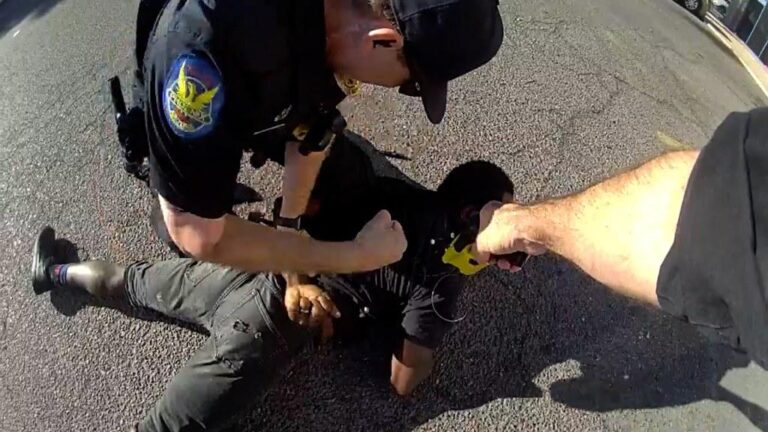Phoenix prosecutors have dropped all charges against a deaf Black man who was reportedly beaten by Phoenix police during a controversial encounter. The decision comes amid growing scrutiny over the use of force by law enforcement, particularly involving individuals with disabilities and minority communities. The case has sparked widespread calls for accountability and reform within the Phoenix Police Department, highlighting ongoing tensions around policing practices in the city.
Arizona Prosecutors Drop Charges Following Controversial Police Beating
In a significant move, prosecutors in Arizona have dropped all charges against a deaf Black man who was subjected to a highly controversial police beating in Phoenix. The incident, which sparked widespread outrage and calls for justice, brought national attention to issues of police brutality and the treatment of individuals with disabilities. Authorities cited insufficient evidence and concerns about the appropriateness of the initial charging decisions as key factors influencing their reversal. The decision underscores ongoing scrutiny of law enforcement practices and raises questions about accountability and systemic reform within police departments.
Community advocates and civil rights groups welcomed the decision but emphasized that the case highlighted urgent areas needing improvement. Key points arising from the incident include:
- Communication Barriers: Challenges faced by deaf individuals in encounters with law enforcement.
- Use of Force: Examination of when and how police apply physical force in confrontations.
- Policy Oversight: Necessity for clearer guidelines and training on handling vulnerable populations.
The case continues to fuel ongoing debates about policing standards and has spurred demands for transparency and enhanced protections for marginalized communities.
Examination of Law Enforcement Accountability in Cases Involving Disabled Individuals
The recent decision by Arizona prosecutors to drop charges against a deaf Black man subjected to police violence in Phoenix spotlights critical gaps in law enforcement accountability, especially in incidents involving disabled individuals. This case has reignited conversations about the necessity for specialized training, including sign language and disability awareness, to ensure officers respond appropriately and respectfully during encounters. Experts argue that the failure to recognize and accommodate disabilities in high-pressure situations can escalate conflicts unnecessarily, putting vulnerable populations at greater risk.
- Communication Barriers: Deaf individuals often face challenges in conveying their compliance or distress, which may be misinterpreted by police.
- Policy Reforms: There’s a rising call for mandating the presence of interpreters or using technology to facilitate communication during arrests.
- Accountability Measures: Improved body camera protocols and independent oversight could enhance transparency in such encounters.
| Key Concern | Current Status | Recommended Action |
|---|---|---|
| Officer Training | Inconsistent | Standardize Disability Awareness Programs |
| Use of Force | Excessive in Some Cases | Implement De-escalation Protocols for Disabled Individuals |
| Legal Oversight | Reactive | Proactive Independent Review Boards |
The broader implications of this case extend beyond one individual, emphasizing the urgent need for systemic changes to protect disabled citizens from abuse and ensure justice is served. Advocates encourage ongoing collaboration between disability rights groups and law enforcement agencies to foster trust and promote equitable treatment under the law.
Impact on Community Trust and Calls for Police Reform in Phoenix
The incident has deeply rattled community trust in Phoenix, highlighting ongoing concerns about police brutality and systemic biases. Residents and advocacy groups have voiced their outrage over the treatment of the deaf Black man, emphasizing the urgent need for accountability and more transparent policing practices. The fact that charges were initially brought forward, only to be dropped later, adds to a growing skepticism about the fairness of the justice system and its approach to marginalized communities.
Calls for reform have intensified, with demands focusing on:
- Enhanced training for officers on handling interactions with people with disabilities and racial minorities
- Improved transparency measures, including body camera use and public reporting
- Independent oversight committees to review police conduct and complaints
- Community engagement programs to rebuild trust and foster better police-community relations
| Reform Area | Community Expectation |
|---|---|
| Training | Disability & Cultural Sensitivity |
| Transparency | Body Cameras & Incident Reporting |
| Oversight | Independent Review Boards |
| Engagement | Open Forums & Collaborative Initiatives |
These measures reflect a broader push across Phoenix to not only prevent future incidents but to create a policing culture genuinely reflective of community values and respect for human rights.
Recommendations for Improving Interaction Protocols with Deaf and Minority Citizens
Enhancing communication between law enforcement and deaf and minority citizens requires a multi-faceted approach. Agencies must prioritize comprehensive training in American Sign Language (ASL) and cultural competency to ensure officers understand both linguistic and social nuances. Providing access to certified interpreters during interactions can prevent misunderstandings and reduce the risk of unnecessary force. Furthermore, law enforcement should adopt clear protocols that mandate the early identification of individuals with disabilities to tailor their responses appropriately.
Integration of technology can also bridge communication gaps and improve transparency. Tools such as real-time captioning applications and video relay services may assist officers during encounters with deaf individuals. Community engagement programs aimed at building trust are essential, especially in minority neighborhoods where historical tensions run deep. The following table outlines key recommendations for reform:
| Recommendation | Purpose |
|---|---|
| Mandatory ASL & Cultural Training | Better communication and reduced bias |
| Certified Interpreter Access | Accurate information exchange |
| Use of Real-time Captioning Tech | Instant communication support |
| Community-Based Outreach | Building trust and mutual understanding |
- Implement clear identification protocols for recognizing disabilities during emergencies.
- Regularly review and update interaction policies based on community feedback.
- Increase diversity among law enforcement ranks to reflect the communities served.
In Conclusion
The decision to drop charges against the deaf Black man who was beaten by Phoenix police marks a significant, albeit contentious, development in a case that has drawn widespread attention to issues of police conduct and racial justice. As the community and advocacy groups continue to call for accountability and systemic reforms, this incident underscores the ongoing challenges faced by marginalized individuals in the criminal justice system. Authorities have yet to announce any further actions or investigations related to the conduct of the officers involved. The case remains a stark reminder of the urgent need for transparency and equitable treatment under the law.









